(沪教牛津)五年级英语下册 Unit 1 Use your eyes!教学课件
文档属性
| 名称 | (沪教牛津)五年级英语下册 Unit 1 Use your eyes!教学课件 | 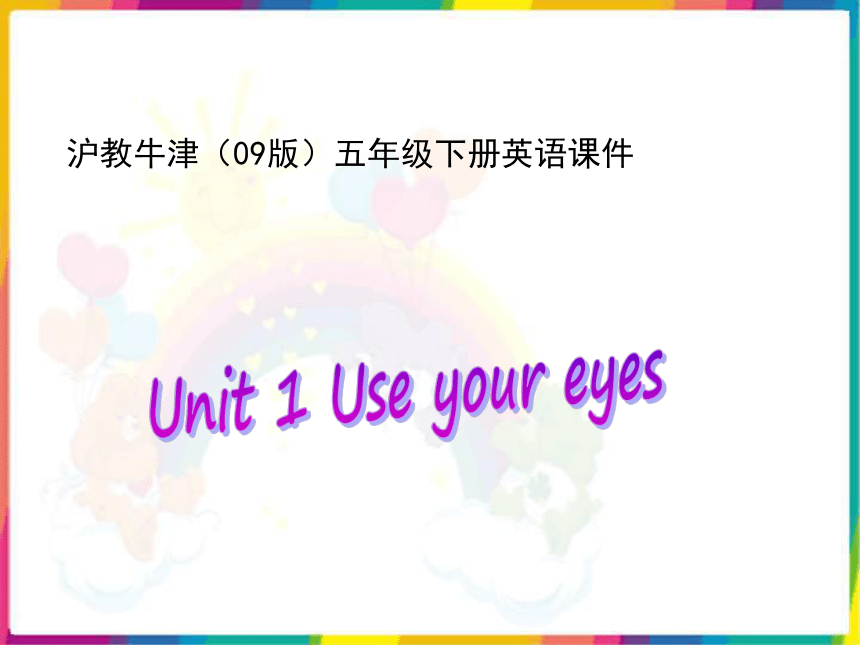 | |
| 格式 | zip | ||
| 文件大小 | 484.4KB | ||
| 资源类型 | 教案 | ||
| 版本资源 | 上海牛津(绿色上教版) | ||
| 科目 | 英语 | ||
| 更新时间 | 2012-05-26 12:26:27 | ||
图片预览


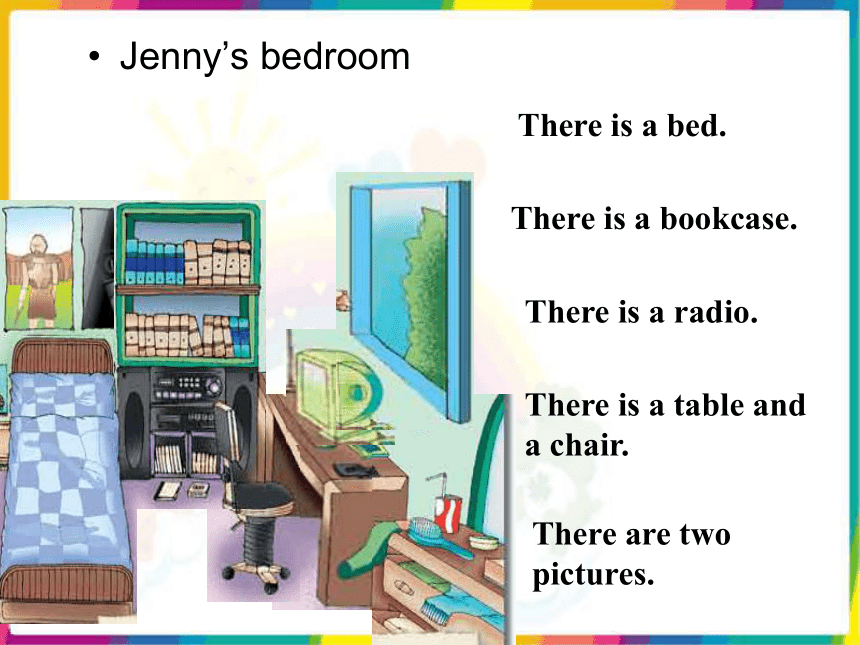
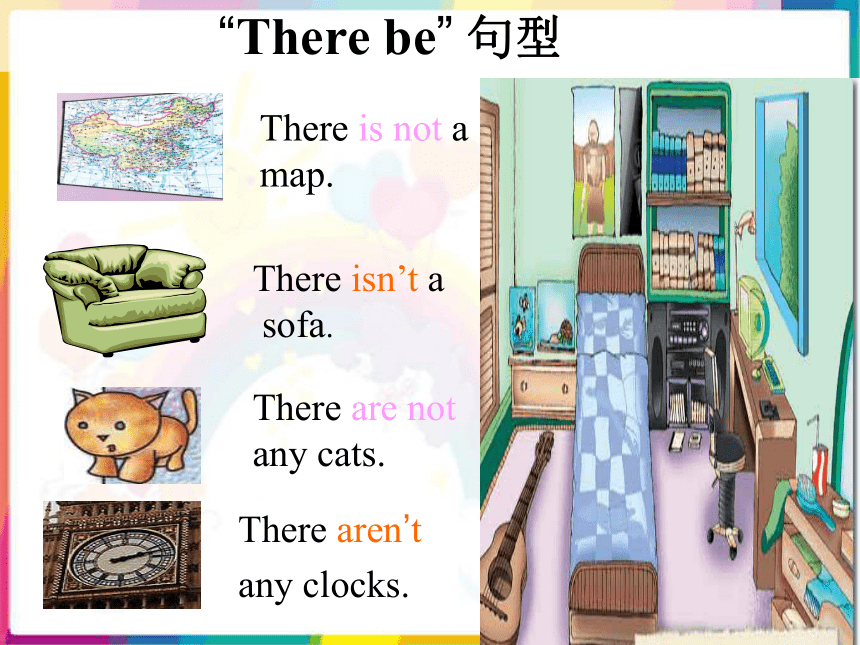
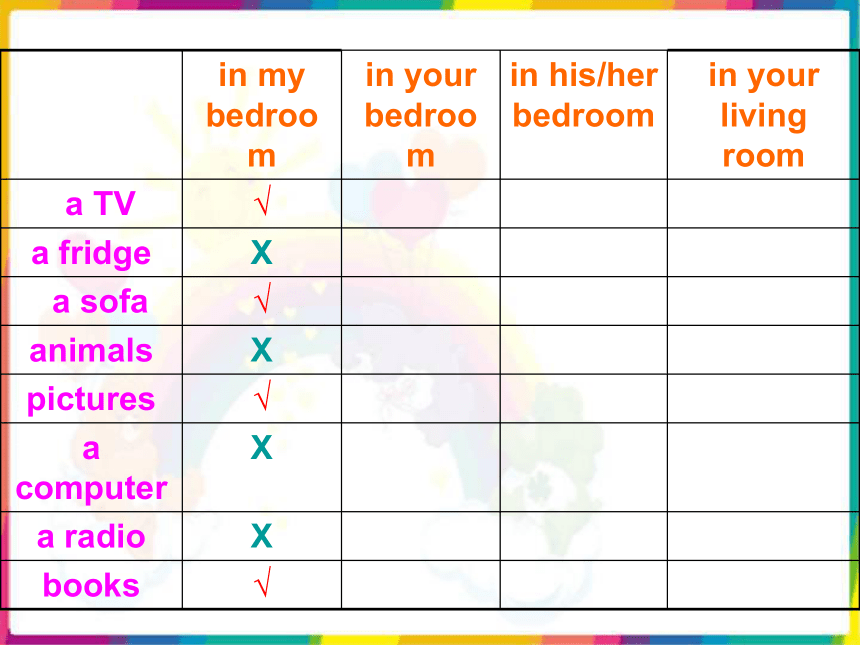

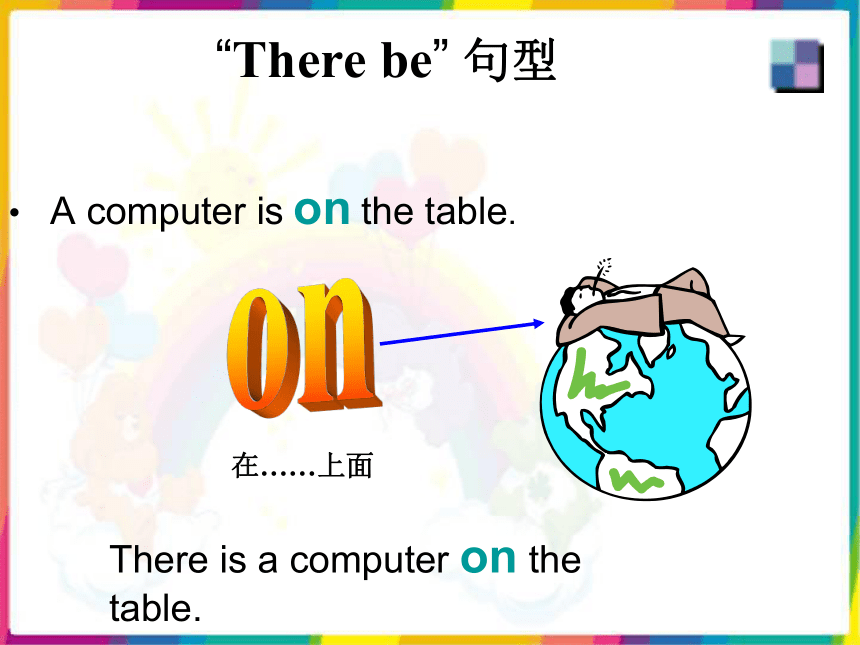
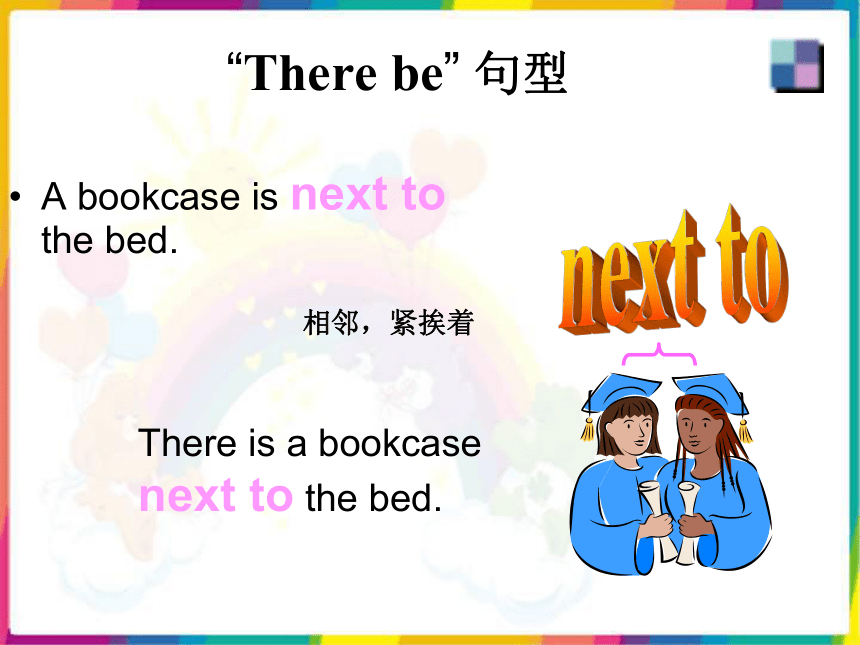
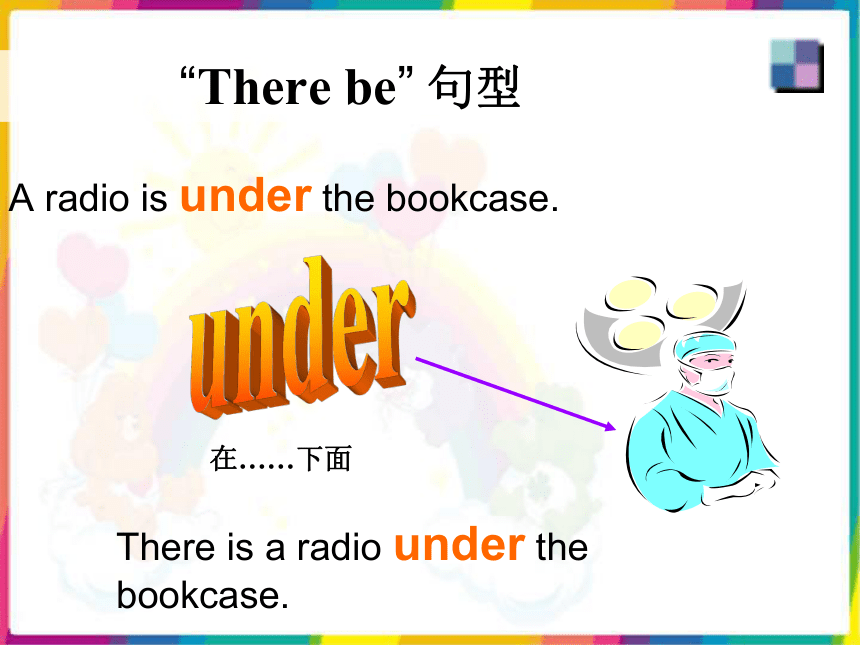
文档简介
(共24张PPT)
沪教牛津(09版)五年级下册英语课件
“There be” 句型
Use your eyes,Jenny的房间里都有什么 看看谁能用最短的时间记得又多又快!
Jenny’s bedroom
There is a bed.
There is a bookcase.
There is a radio.
There is a table and a chair.
There are two pictures.
“There be” 句型
There aren’t
any clocks.
There is not a map.
There isn’t a
sofa.
There are not any cats.
in my bedroom in your bedroom in his/her bedroom in your living room
a TV √
a fridge X
a sofa √
animals X
pictures √
a computer X
a radio X
books √
“There be” 句型
图中的这些物品都在什么位置?你能描述它们的位置关系吗?
“There be” 句型
A computer is on the table.
在……上面
There is a computer on the table.
“There be” 句型
A bookcase is next to the bed.
相邻,紧挨着
There is a bookcase next to the bed.
“There be” 句型
A radio is under the bookcase.
在……下面
There is a radio under the bookcase.
“There be” 句型
A table is between the dresser and the radio.
在…和…中间
There is a table between the dresser and the radio.
“There be” 句型
A man is in the picture.
在……里面
There is a man in the picture.
“There be” 句型
Exercise 2
kitchen
dining room
bath room
living room
汉译英:
1.我是莉莉。
2.我们是男孩。
3.你13岁。
4.他是学生。
5.你们在孟河中学学习。
6.我每天洗碗。
7.你有时乘车回家。
8.他们通常11:30吃午餐。
9.她经常帮助别人。
10.他总是起的很早。
11.尼克在周末参观博物馆。
I am Lily.
We are boys.
You are 13.
He is a student.
You study at Menghe Secondary School.
I wash the dishes every day.
You sometimes take a bus home.
They usually have lunch at 11:30.
She often helps others.
He always gets up early.
Nick visits museums at weekends.
Things are always true
1. 客观事实
Things are true now
2. 符合现在事实情况
Things we do regularly
3. 经常、习惯、反复做的事情
I am Lily.
We are boys.
The moon goes round the earth.
You are 13.
He is a student.
You study at Menghe Secondary School.
I wash the dishes every day.
You sometimes take a bus home.
They usually have lunch at 11:30.
She often helps others.
He always gets up early.
Nick visits museums at weekends.
She is often late for school.
一般现在时的三种用法
The Simple Present Tense
一 般 现 在 时
一 般 现 在 时(The Simple Present Tense )用来表示:1. 客观事实; 2. 符合现在事实情况;3. 经常、习惯、反复做的事情,常与表示凭率的时间词连用,如:every …,sometimes,often,usually,always,on Sundays 等。
be: am, is, are
Do(实义动词):主语是第一、二、三人称复数时 用原形;
主语是第三人称单数时用动词的三单式。
Can you get the rules of verb “be”.
Discuss with your partners and get the rules.
I +
You / we /they +
He /she/ it/ the third person single form +
am
are
is
Are you… Yes, I am. No, I am not.
Are you… Yes, we are. No, we aren’t.
Am I /Are you… Yes, you are. No, you aren’t.
Is he/she/it… Yes, he/she/it is. No, he/she/it isn’t.
Are they… Yes, they are. No, they aren’t.
not
not (aren’t)
not (isn’t)
1.We study at Menghe Secondary School.
2.I wash the dishes every day.
3.You sometimes take a bus home.
4.They usually have lunch at 11:30.
We don’t study at Menghe Secondary School.
I don’t wash the dishes every day.
You don’t sometimes take a bus home.
They don’t usually have lunch at 11:30.
Do you study at Menghe Secondary School Yes, we do. / No, we don’t.
Do you wash the dishes every day Yes, I do. / No, I don’t.
Do we sometimes take a bus home Yes, you do. / No, you don’t.
Do they usually have lunch at 11:30 Yes, they do. / No, they don’t.
I / We / You / They do ….
I / We / You / They don’t do … .
Do I / we / you / they do …
Yes, I /we/you/they do.
No, I /we/you/they don’t.
1.她喜欢看书。
2.他每天吃早饭。
3.他经常看电视。
4.她星期天放风筝。
5.他很想念母亲。
She likes reading.
He has breakfast every day.
He often watches TV.
She flies a kite on Sundays.
He misses his mother very much.
Most verbs +s talk----talks
Look---looks
Ending with consonant+ y -y+ies fly---flies
Ending in ss,ch,sh or x +es miss--- misses
watch---watches
wash----washes
fix---fixes
read carry go bring play watch fly do wash study help visit exercise enjoy jump have
--reads
--carries
--goes
--brings
-- plays
--watches
-- flies
-- does
--washes
-- studies
-- helps
-- visits
-- exercises
-- enjoys
-- jumps
-- has
He/She likes reading.
He/She has breakfast every day
He/she watches TV.
He/She flies kites on Sundays.
He/She misses his/her mother.
…
He/She doesn’t miss his/her mother.
…
Does he/she miss his/her mother
…
Think about “it”
Yes, he/she does. No, he/she doesn’t.
He/She doesn’t like reading.
He/She doesn’t have breakfast every day.
He/she doesn’t watch TV.
He/She doesn’t fly kites on Sundays.
Does he/she like reading
Does he/she have breakfast every day
Does he/she watch TV
Does he/she fly kites on Sundays
He/She/It does….
He/She/It doesn’t do….
Does he/she/it do….
Yes, he/she/it does. No, he/she/it doesn’t.
Fill in the blanks:
Dear Daved,
At the weekend, I usually _________(go) running for half an hour. Then I _______ (play) football. My mother _______________(not watch) our games but my father __________ (watch) them. I ______ (be) good at football. ________ (be) you good at football In the evenings, we often ________ (have) dinner at my grandparents’ home. Sometimes, we _______ (eat) in a restaurant. Write soon!
Simon
go
play
doesn’t watch
watches
am
Are
have
eat
1.
2. ______ Andy _______ (take) a bus to school everyday
3. ______ your friends _______ (write) e-mails to you
4. What ______ the dog ______ (do)
Does take
Do write
does do
沪教牛津(09版)五年级下册英语课件
“There be” 句型
Use your eyes,Jenny的房间里都有什么 看看谁能用最短的时间记得又多又快!
Jenny’s bedroom
There is a bed.
There is a bookcase.
There is a radio.
There is a table and a chair.
There are two pictures.
“There be” 句型
There aren’t
any clocks.
There is not a map.
There isn’t a
sofa.
There are not any cats.
in my bedroom in your bedroom in his/her bedroom in your living room
a TV √
a fridge X
a sofa √
animals X
pictures √
a computer X
a radio X
books √
“There be” 句型
图中的这些物品都在什么位置?你能描述它们的位置关系吗?
“There be” 句型
A computer is on the table.
在……上面
There is a computer on the table.
“There be” 句型
A bookcase is next to the bed.
相邻,紧挨着
There is a bookcase next to the bed.
“There be” 句型
A radio is under the bookcase.
在……下面
There is a radio under the bookcase.
“There be” 句型
A table is between the dresser and the radio.
在…和…中间
There is a table between the dresser and the radio.
“There be” 句型
A man is in the picture.
在……里面
There is a man in the picture.
“There be” 句型
Exercise 2
kitchen
dining room
bath room
living room
汉译英:
1.我是莉莉。
2.我们是男孩。
3.你13岁。
4.他是学生。
5.你们在孟河中学学习。
6.我每天洗碗。
7.你有时乘车回家。
8.他们通常11:30吃午餐。
9.她经常帮助别人。
10.他总是起的很早。
11.尼克在周末参观博物馆。
I am Lily.
We are boys.
You are 13.
He is a student.
You study at Menghe Secondary School.
I wash the dishes every day.
You sometimes take a bus home.
They usually have lunch at 11:30.
She often helps others.
He always gets up early.
Nick visits museums at weekends.
Things are always true
1. 客观事实
Things are true now
2. 符合现在事实情况
Things we do regularly
3. 经常、习惯、反复做的事情
I am Lily.
We are boys.
The moon goes round the earth.
You are 13.
He is a student.
You study at Menghe Secondary School.
I wash the dishes every day.
You sometimes take a bus home.
They usually have lunch at 11:30.
She often helps others.
He always gets up early.
Nick visits museums at weekends.
She is often late for school.
一般现在时的三种用法
The Simple Present Tense
一 般 现 在 时
一 般 现 在 时(The Simple Present Tense )用来表示:1. 客观事实; 2. 符合现在事实情况;3. 经常、习惯、反复做的事情,常与表示凭率的时间词连用,如:every …,sometimes,often,usually,always,on Sundays 等。
be: am, is, are
Do(实义动词):主语是第一、二、三人称复数时 用原形;
主语是第三人称单数时用动词的三单式。
Can you get the rules of verb “be”.
Discuss with your partners and get the rules.
I +
You / we /they +
He /she/ it/ the third person single form +
am
are
is
Are you… Yes, I am. No, I am not.
Are you… Yes, we are. No, we aren’t.
Am I /Are you… Yes, you are. No, you aren’t.
Is he/she/it… Yes, he/she/it is. No, he/she/it isn’t.
Are they… Yes, they are. No, they aren’t.
not
not (aren’t)
not (isn’t)
1.We study at Menghe Secondary School.
2.I wash the dishes every day.
3.You sometimes take a bus home.
4.They usually have lunch at 11:30.
We don’t study at Menghe Secondary School.
I don’t wash the dishes every day.
You don’t sometimes take a bus home.
They don’t usually have lunch at 11:30.
Do you study at Menghe Secondary School Yes, we do. / No, we don’t.
Do you wash the dishes every day Yes, I do. / No, I don’t.
Do we sometimes take a bus home Yes, you do. / No, you don’t.
Do they usually have lunch at 11:30 Yes, they do. / No, they don’t.
I / We / You / They do ….
I / We / You / They don’t do … .
Do I / we / you / they do …
Yes, I /we/you/they do.
No, I /we/you/they don’t.
1.她喜欢看书。
2.他每天吃早饭。
3.他经常看电视。
4.她星期天放风筝。
5.他很想念母亲。
She likes reading.
He has breakfast every day.
He often watches TV.
She flies a kite on Sundays.
He misses his mother very much.
Most verbs +s talk----talks
Look---looks
Ending with consonant+ y -y+ies fly---flies
Ending in ss,ch,sh or x +es miss--- misses
watch---watches
wash----washes
fix---fixes
read carry go bring play watch fly do wash study help visit exercise enjoy jump have
--reads
--carries
--goes
--brings
-- plays
--watches
-- flies
-- does
--washes
-- studies
-- helps
-- visits
-- exercises
-- enjoys
-- jumps
-- has
He/She likes reading.
He/She has breakfast every day
He/she watches TV.
He/She flies kites on Sundays.
He/She misses his/her mother.
…
He/She doesn’t miss his/her mother.
…
Does he/she miss his/her mother
…
Think about “it”
Yes, he/she does. No, he/she doesn’t.
He/She doesn’t like reading.
He/She doesn’t have breakfast every day.
He/she doesn’t watch TV.
He/She doesn’t fly kites on Sundays.
Does he/she like reading
Does he/she have breakfast every day
Does he/she watch TV
Does he/she fly kites on Sundays
He/She/It does….
He/She/It doesn’t do….
Does he/she/it do….
Yes, he/she/it does. No, he/she/it doesn’t.
Fill in the blanks:
Dear Daved,
At the weekend, I usually _________(go) running for half an hour. Then I _______ (play) football. My mother _______________(not watch) our games but my father __________ (watch) them. I ______ (be) good at football. ________ (be) you good at football In the evenings, we often ________ (have) dinner at my grandparents’ home. Sometimes, we _______ (eat) in a restaurant. Write soon!
Simon
go
play
doesn’t watch
watches
am
Are
have
eat
1.
2. ______ Andy _______ (take) a bus to school everyday
3. ______ your friends _______ (write) e-mails to you
4. What ______ the dog ______ (do)
Does take
Do write
does do
同课章节目录
- Module 1 Using my five senses
- Unit 1 Use your eyes!
- Unit 2 Use your ears!
- Unit 3 Use your hands!
- Unit 4 Use your five senses!
- Module 2 My favourite things
- Unit 1 Animals in the zoo
- Unit 2 Favourite toys
- Unit 3 At home
- Module 3 Things around us
- Unit 1 Colours around us
- Unit 2 Different noises
- Unit 3 What is the weather like?
